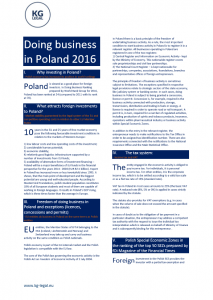 Polish Special Economic Zones in the ranking of the top 50 SEZs prepared by fDi Magazine of the Financial Times.
Polish Special Economic Zones in the ranking of the top 50 SEZs prepared by fDi Magazine of the Financial Times.
Foreign investment in the Polish SEZ provides the investor with a partial tax exemption and Poland 10 EU The Foreign 2 guarantees that the intended purpose of the real property acquired or leased for investment is commercial and industrial one.
Special Economic Zone in Katowice (in southwestern Poland) has leading position in the ranking of the top 50 special economic zones in the world. What is more, it has been recognized as the Regional Winner for in Europe, Sub-regional Winner in central-eastern Europe, highly commended in Europe for Large Tenants Awards and SME Awards in fDi Global Free Zones of the Year 2016. SEZs in Poland are areas of special economic and tax status for investors (currently – 16.000 hectares). Businesses investing in the SEZ may benefit from state aid in the form of a partial income tax emption.
More
 The tax system: – Income tax and VAT entity engaged in the economic activity is obliged to pay income tax. For individuals, it is personal income tax. For other entities, it is the corporate income tax, which is to be settled according to a valid tax scale or as a flat tax rate of 19% (standard rate). VAT tax in Poland in most cases amounts to 23% (the basic VAT rate). A reduced rate (8%, 5% or 0%) is applied in cases strictly indicated by the statute. The statute also provides for VAT exemptions (e.g. in cases when the volume of sale does not exceed the amount specified in the statute). In cases of doubt as to the obligation of tax payment in a particular situation, the entrepreneur may address a competent tax authority with the request to issue the individual tax interpretation which is released on behalf of Ministry of Finance and is subsequently binding for this entrepreneur .
The tax system: – Income tax and VAT entity engaged in the economic activity is obliged to pay income tax. For individuals, it is personal income tax. For other entities, it is the corporate income tax, which is to be settled according to a valid tax scale or as a flat tax rate of 19% (standard rate). VAT tax in Poland in most cases amounts to 23% (the basic VAT rate). A reduced rate (8%, 5% or 0%) is applied in cases strictly indicated by the statute. The statute also provides for VAT exemptions (e.g. in cases when the volume of sale does not exceed the amount specified in the statute). In cases of doubt as to the obligation of tax payment in a particular situation, the entrepreneur may address a competent tax authority with the request to issue the individual tax interpretation which is released on behalf of Ministry of Finance and is subsequently binding for this entrepreneur .
More
 Freedom of doing business in Poland and exceptions (licences, concessions and permits) – EU entities do business in Poland on the same terms as Polish entities entities, the Member States of EFTA belonging to the EEA (Iceland, Liechtenstein and Norway) and Switzerland may take up and carry out business activity on the same condition as Polish nationals.
Freedom of doing business in Poland and exceptions (licences, concessions and permits) – EU entities do business in Poland on the same terms as Polish entities entities, the Member States of EFTA belonging to the EEA (Iceland, Liechtenstein and Norway) and Switzerland may take up and carry out business activity on the same condition as Polish nationals.
Polish economy is part of the EU internal market and the Polish legislation is compatible with the EU law. The core of the Polish law governing the economic activity is the Polish Act on Freedom of Economic Activity of 2 July 2004.
More

Innovations are a challenge to current legal solutions. For example, voice biometrics technology may cause a problem for the applicable legal provisions in personal data protection. In Poland the area of personal data protection is regulated under Personal Data Protection Act of 29 August 1997 (Journal of Laws of 2016, item 922)
What is biometrics?
Do you want to take care of something through the hotline of your bank or call centre? Or maybe you already have so much passwords, that you are not able to remember them all? Accounts, passwords, logins, other varied verification processes – taking care of safety becoming time-consuming. But there is a technology, that enables to save your time – it is called voice biometrics.
More

Doing business in Poland 2016
I. Why investing in Poland?
– Polish economy has increased its position in world rankings
Poland is viewed as a good place for foreign investors. In Doing Business Ranking prepared by World Bank Group for 2016, Poland has been ranked at 24 (compared to 2011 with its rank at 70).
More
 Polish Special Economic Zones in the ranking of the top 50 SEZs prepared by fDi Magazine of the Financial Times.
Polish Special Economic Zones in the ranking of the top 50 SEZs prepared by fDi Magazine of the Financial Times.

